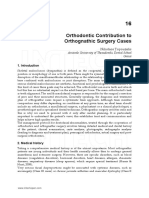Sleep Disorders For Dummies
Sleep Disorders For Dummies
Uploaded by
alexmtzgCopyright:
Available Formats
Sleep Disorders For Dummies
Sleep Disorders For Dummies
Uploaded by
alexmtzgOriginal Description:
Original Title
Copyright
Available Formats
Share this document
Did you find this document useful?
Is this content inappropriate?
Copyright:
Available Formats
Sleep Disorders For Dummies
Sleep Disorders For Dummies
Uploaded by
alexmtzgCopyright:
Available Formats
book review
p 98.qxp
1/4/2005
2:50 PM
Page 98
BOOK REVIEW
Sleep Disorders for Dummies
by Max Hirshkowitz and Patricia B. Smith, 355 pp, with index, $19.99, ISBN 0-7645-3901-9, Hoboken, NJ, Wiley Publishing, Inc.
Wolfgang Schmidt-Nowara, M.D.
Sleep Medicine Institute, Presbyterian Hospital of Dallas, Dallas, TX
J Clin Sleep Med 2005;1(1):98
hose of us who have used the self-help guide, PC for
Dummies, may be surprised to learn that similar help is now
available for such non-digital challenges as Golf, Feng Shui, and
various medical disorders including Diabetes, High Blood
Pressure, Fibromyalgia and Thyroid. The books feature simple
language, short paragraphs, checklists, and frequent sub-headings and icons to assist the reader with limited time or interest.
Sleep Disorders .. is dedicated to the sleepless, i.e. the reader
who seeks help for ineffective sleep, and it largely succeeds. The
books scope is broad, encompassing the full range of sleep complaints and all categories of sleep disorders. The emphasis on
sleep behaviors as the basis for many sleep problems is appropriate for the majority of likely readers. Physicians may be surprised
at the relatively lesser emphasis on important medical problems.
For example the chapter on obstructive sleep apnea devotes 16 of
26 pages to uncomplicated snoring, has little to say about cardiovascular complications of OSA, and offers no advice on how to
succeed with CPAP. Readers are appropriately directed to medical help for more serious disorders. The description of what to
expect in a sleep laboratory is particularly helpful. Advice is provided on virtually every page. Consistent with the focus on self
help, much advice falls in the categories of common sense, sleep
nostrums and popular lore. The style is encouraging (you are not
alone) and supportive (I feel your pain) and contemporary (lists
of top ten tips).
Sleep Disorders .. joins a considerable lay literature advocating attention to sleep for a better life. A common failing of this
paradigm, and Sleep Disorders .. is no exception, is a tendency
to exaggerate, to stretch the truth by allusion and frank misstatement. For example, I object to the claim that poor sleep may
cause increased mortality. Even when qualified with the ubiquitous may, the association with every day insomnia or fatigue is
junk science at best and certainly a kind of puffery that most professionals would avoid. Ditto for poor sleep and infections.
Breathing problems are invariably associated with a lack of oxygen, which is conceptually simplistic and sometimes (e.g. yawning) plain wrong; and so on. When it comes to treatment suggestions, the book includes remedies that have no basis in clinical
science or routine medical practice. For example, does clutter in
the bedroom promote insomnia? Does a jet lag visor really help
anyone other than the manufacturer? Does drinking lots of water
correct snoring, a problem that anti-histamines are said to promote by virtue of their drying effect?
Of course a self-help book for non-professionals does not need
to observe the restraints of scientific evidence, and Sleep
Disorders .. certainly does not. My problem is that the distinction between sleep medicine and non-scientific information is
missing in this book. The holistic and unorthodox approach to
sleep disorders presented here is quite different from the majority vision of sleep specialists that attempt to base clinical practice
on scientific evidence and wish to place their specialty in mainstream medicine. Thus this reader is not likely to use this book in
his clinical practice. For the uninitiated reader, however, who
seeks an introduction to the world of sleep, Sleep Disorders ..
will provide lots of information along with comfort and reassurance. And no one can disagree with the basic message that poor
sleep does not have to be and that help is available.
Disclosure Statement
Dr. Schmidt-Nowara has indicated no financial conflict of interest.
Submitted for publication October 2004
Accepted for publication October 2004
Address correspondence to: Wolfgang Schmidt-Nowara, M.D., Sleep Medicine
Associates of Texas, 8140 Walnut Hill Lane S100, Dallas, TX, 75231; Tel: (214)
750-7776; Fax: (214) 750-4621; E-mail: wsn@sleepmed.com
Journal of Clinical Sleep Medicine, Vol. 1, No. 1, 2005
98
You might also like
- Microbiology Nuts & BoltsDocument42 pagesMicrobiology Nuts & Boltsteena jacobNo ratings yet
- The Science of Self-Hypnosis The Evidence - Adam EasonDocument328 pagesThe Science of Self-Hypnosis The Evidence - Adam Easonmimic khider100% (11)
- Not Tonight: Migraine and the Politics of Gender and HealthFrom EverandNot Tonight: Migraine and the Politics of Gender and HealthRating: 4 out of 5 stars4/5 (1)
- Essentials of Sleep Medicine: M. Safwan Badr Jennifer L. Martin EditorsDocument521 pagesEssentials of Sleep Medicine: M. Safwan Badr Jennifer L. Martin Editorsneumologia.intervencion100% (4)
- A Challenging Second OpinionDocument313 pagesA Challenging Second Opinionnandijohn78No ratings yet
- 8 The Cause of Disease by Kenneth S. JaffreyDocument35 pages8 The Cause of Disease by Kenneth S. JaffreyAnonymous fO8xe7rMyA100% (1)
- Hypnosis For Chronic Pain Management - Wo - Mark P. JensenDocument160 pagesHypnosis For Chronic Pain Management - Wo - Mark P. Jensenseveruspiton980% (5)
- Mark P Jensen Hypnosis For Chronic Pain Management Workbook 2011Document160 pagesMark P Jensen Hypnosis For Chronic Pain Management Workbook 2011Costica Dron100% (7)
- Home Study Course-HomeopathDocument155 pagesHome Study Course-HomeopathAzad Ansari70% (10)
- Book Arthur Coca The Pulse Test Find AllergiesDocument121 pagesBook Arthur Coca The Pulse Test Find Allergiesapi-269724919No ratings yet
- Precios Unitarios Ref.Document21 pagesPrecios Unitarios Ref.Nilton Jara ChalcoNo ratings yet
- Anemometro ISO - 16622 - EN PDFDocument11 pagesAnemometro ISO - 16622 - EN PDFfernando ochoaNo ratings yet
- Review of "Sleep Disorders For Dummies": To The EditorDocument1 pageReview of "Sleep Disorders For Dummies": To The EditoralexmtzgNo ratings yet
- No More Allergies, Asthma or Sinus Infections: The Revolutionary ApproachFrom EverandNo More Allergies, Asthma or Sinus Infections: The Revolutionary ApproachRating: 3 out of 5 stars3/5 (1)
- Asthma and Allergy Solution that Works for COVID-19: The Powerful Natural Prescription for Respiratory Health During the Conronavirus PandemicFrom EverandAsthma and Allergy Solution that Works for COVID-19: The Powerful Natural Prescription for Respiratory Health During the Conronavirus PandemicNo ratings yet
- How To Achieve SuperhealthDocument24 pagesHow To Achieve SuperhealthJulian Williams©™No ratings yet
- M.D. Benjamin Root - Understanding Panic and Other Anxiety Disorders (Understanding Health and Sickness Series) - University Press of Mississippi (2000)Document122 pagesM.D. Benjamin Root - Understanding Panic and Other Anxiety Disorders (Understanding Health and Sickness Series) - University Press of Mississippi (2000)AřDit100% (1)
- Pulse Test DiagnosisDocument19 pagesPulse Test DiagnosisJavierNo ratings yet
- Stephen B. Edelson & Deborah Mitchell - What Your Doctor May Not Tell You About(TM) Autoimmune Disorders-Grand Central Publishing (2003)Document289 pagesStephen B. Edelson & Deborah Mitchell - What Your Doctor May Not Tell You About(TM) Autoimmune Disorders-Grand Central Publishing (2003)maheshmuralinair6No ratings yet
- Your Immune System: Are you taking care of it?From EverandYour Immune System: Are you taking care of it?Rating: 4 out of 5 stars4/5 (1)
- Bits & Pieces You Might've Missed About Your Ankylosing Spondylitis (AS)From EverandBits & Pieces You Might've Missed About Your Ankylosing Spondylitis (AS)Rating: 5 out of 5 stars5/5 (1)
- Your Aching Back: A Doctor's Guide to ReliefFrom EverandYour Aching Back: A Doctor's Guide to ReliefRating: 3.5 out of 5 stars3.5/5 (2)
- Psychological Assistance For Dying Patient and His FamilyDocument14 pagesPsychological Assistance For Dying Patient and His Family......No ratings yet
- Overcoming Medical Phobias1Document175 pagesOvercoming Medical Phobias1Hd Laura100% (1)
- Edmund Jacobson You Must Relax Health PsychologyDocument194 pagesEdmund Jacobson You Must Relax Health PsychologyRaluca Onose100% (6)
- Freedom from Cpap: Sleep Apnea Hurts, the Cure Doesn’t Have ToFrom EverandFreedom from Cpap: Sleep Apnea Hurts, the Cure Doesn’t Have ToNo ratings yet
- The Parent's Guide to the Medical World of Autism: A Physician Explains Diagnosis, Medications and TreatmentsFrom EverandThe Parent's Guide to the Medical World of Autism: A Physician Explains Diagnosis, Medications and TreatmentsRating: 2 out of 5 stars2/5 (2)
- You CAN Prevent Alzheimer's!: A Neuropsychologist's Secrets to Better Brain HealthFrom EverandYou CAN Prevent Alzheimer's!: A Neuropsychologist's Secrets to Better Brain HealthNo ratings yet
- Psychiatry and the Business of Madness: An Ethical and Epistemological AccountingFrom EverandPsychiatry and the Business of Madness: An Ethical and Epistemological AccountingRating: 4 out of 5 stars4/5 (2)
- Alternative Medicine For Allergies, Colds & Flu: Easy-To-Follow Guide to Fixing Acute & Chronic ConditionsFrom EverandAlternative Medicine For Allergies, Colds & Flu: Easy-To-Follow Guide to Fixing Acute & Chronic ConditionsNo ratings yet
- You Have Good Reasons To Be HopefulDocument4 pagesYou Have Good Reasons To Be HopefuldarvasfortunesNo ratings yet
- The Natural Cure To Common Gume DeseasesDocument93 pagesThe Natural Cure To Common Gume DeseasesiliyadNo ratings yet
- Dokumen - Pub Insomnia How Can I Get To Sleep Your Guide To Overcoming Insomnia Sleeplessness and Getting A Good Night SleepDocument73 pagesDokumen - Pub Insomnia How Can I Get To Sleep Your Guide To Overcoming Insomnia Sleeplessness and Getting A Good Night SleepiamalwindNo ratings yet
- Depression - What should I doFrom EverandDepression - What should I doDigital WorldNo ratings yet
- A Stethoscope for the Brain: Preventive Approaches to Protect the MindFrom EverandA Stethoscope for the Brain: Preventive Approaches to Protect the MindNo ratings yet
- Headaches – The CommonSense Approach: Become Your Own 'Headache Detective'From EverandHeadaches – The CommonSense Approach: Become Your Own 'Headache Detective'No ratings yet
- Don Bennett - Excerpts From... Avoiding Degenerative DiseaseDocument72 pagesDon Bennett - Excerpts From... Avoiding Degenerative Diseaseraweater100% (3)
- Overcoming Fear of Death: HapterDocument13 pagesOvercoming Fear of Death: HapterGustavoNo ratings yet
- You Got Sick—Now What?: Seven Secrets from Oriental Medicine to Eliminate the Cold and FluFrom EverandYou Got Sick—Now What?: Seven Secrets from Oriental Medicine to Eliminate the Cold and FluNo ratings yet
- Headache Help: A Complete Guide to Understanding Headaches and the Medications That Relieve ThemFrom EverandHeadache Help: A Complete Guide to Understanding Headaches and the Medications That Relieve ThemRating: 4.5 out of 5 stars4.5/5 (5)
- Busting The Myth That Depression Doesn't Affect People in Poor CountriesDocument12 pagesBusting The Myth That Depression Doesn't Affect People in Poor Countrieslynnha09No ratings yet
- DR Sarno Free - Report - 11!09!11Document9 pagesDR Sarno Free - Report - 11!09!11Crisalcala100% (3)
- Coping with Schizophrenia: A CBT Guide for Patients, Families and CaregiversFrom EverandCoping with Schizophrenia: A CBT Guide for Patients, Families and CaregiversRating: 5 out of 5 stars5/5 (2)
- The Pulse Test Book PDFDocument110 pagesThe Pulse Test Book PDFBenoitCornetteNo ratings yet
- My Back Hurts!: A Guide to Understanding What's Wrong and Choosing the Best TreatmentFrom EverandMy Back Hurts!: A Guide to Understanding What's Wrong and Choosing the Best TreatmentNo ratings yet
- Nutrients Quiet the Unquiet Brain: A Four-Generation Bipolar OdysseyFrom EverandNutrients Quiet the Unquiet Brain: A Four-Generation Bipolar OdysseyNo ratings yet
- Using 3shape Data in Lava Design enDocument7 pagesUsing 3shape Data in Lava Design enalexmtzgNo ratings yet
- Palatal: ObturatorsDocument18 pagesPalatal: ObturatorsalexmtzgNo ratings yet
- 02whole PDFDocument267 pages02whole PDFalexmtzgNo ratings yet
- CirugiaDocument27 pagesCirugiaalexmtzgNo ratings yet
- Kls Inv1Document5 pagesKls Inv1alexmtzgNo ratings yet
- K8000c Installation Guide Sm736-Ed02-EnDocument54 pagesK8000c Installation Guide Sm736-Ed02-EnalexmtzgNo ratings yet
- Changing To Past Tense WorksheetsDocument11 pagesChanging To Past Tense Worksheetseas grade04100% (1)
- LTE CommandsDocument1,200 pagesLTE CommandsMostafa Mohamed Elagory84% (25)
- Nano ManualDocument10 pagesNano ManualJullsNo ratings yet
- Tuning Equation of State ModelsDocument34 pagesTuning Equation of State Modelswelltest vspNo ratings yet
- E&I Inspector Shahruddin AwangDocument3 pagesE&I Inspector Shahruddin AwangMohd FiqrieNo ratings yet
- 275 - Evolution of Small Hole Drilling MethodsDocument18 pages275 - Evolution of Small Hole Drilling MethodsPercy CasaniNo ratings yet
- Nursing Management of Patients With Occupational DisordersDocument100 pagesNursing Management of Patients With Occupational DisordersNandini VermaNo ratings yet
- CAT EP30K PAC - Controller Service ManualDocument152 pagesCAT EP30K PAC - Controller Service ManualHoussein ChoumanNo ratings yet
- Multiple Choice:: NAME: - DATE: - SCOREDocument4 pagesMultiple Choice:: NAME: - DATE: - SCOREElenor May Chantal MessakaraengNo ratings yet
- Frozen Ring (HP, Bleach)Document160 pagesFrozen Ring (HP, Bleach)Archit AgrawalNo ratings yet
- Album BTSDocument10 pagesAlbum BTSDeanne Beatrix S. SindolNo ratings yet
- Spectrophotometry: An Analytical ToolDocument25 pagesSpectrophotometry: An Analytical ToolDian Ayu ChotimahNo ratings yet
- Determination of Certified Relieving CapacitiesDocument6 pagesDetermination of Certified Relieving CapacitiesGustavo GarciaNo ratings yet
- Transportation LawsDocument404 pagesTransportation LawsSugar Ree100% (1)
- Korando C300 - LHDDocument510 pagesKorando C300 - LHDDani DanielNo ratings yet
- APPE - Physical Properties of Various Organic and Inorganic SubstancesDocument12 pagesAPPE - Physical Properties of Various Organic and Inorganic SubstancesaniNo ratings yet
- JR202 CB OwDocument2 pagesJR202 CB OwnikolapetkovicccNo ratings yet
- Chapter 2 - Spatial Descriptions and TransformationsDocument30 pagesChapter 2 - Spatial Descriptions and TransformationsEphremNo ratings yet
- RKR Spring 2010 Recipe Book: Whipped CreamDocument38 pagesRKR Spring 2010 Recipe Book: Whipped Creamlookitschex100% (1)
- Linear Transformations: DefinitionsDocument22 pagesLinear Transformations: DefinitionsMiral ElnakibNo ratings yet
- T1-40 Transducer GBDocument2 pagesT1-40 Transducer GBAiham SultanNo ratings yet
- W9 ClampDocument1 pageW9 ClampAndresNo ratings yet
- Ultra-Thin Whitetopping (UTW) Project: UTW Thickness (MM) Joint Spacing (M) Fiber Concrete Plain ConcreteDocument3 pagesUltra-Thin Whitetopping (UTW) Project: UTW Thickness (MM) Joint Spacing (M) Fiber Concrete Plain ConcreteEric GironNo ratings yet
- Procedure For AME Licence - Basic Licence PDFDocument8 pagesProcedure For AME Licence - Basic Licence PDFsaradeepsNo ratings yet
- Organic Peppermint Essential Oil (Mentha Piperita) : Safety Data SheetDocument8 pagesOrganic Peppermint Essential Oil (Mentha Piperita) : Safety Data SheetKhan Abdul BasitNo ratings yet
- Safety of PlatgroundsDocument6 pagesSafety of Platgroundsthiri MyintNo ratings yet
- CASESDocument24 pagesCASESMuhammed FirozNo ratings yet































































































